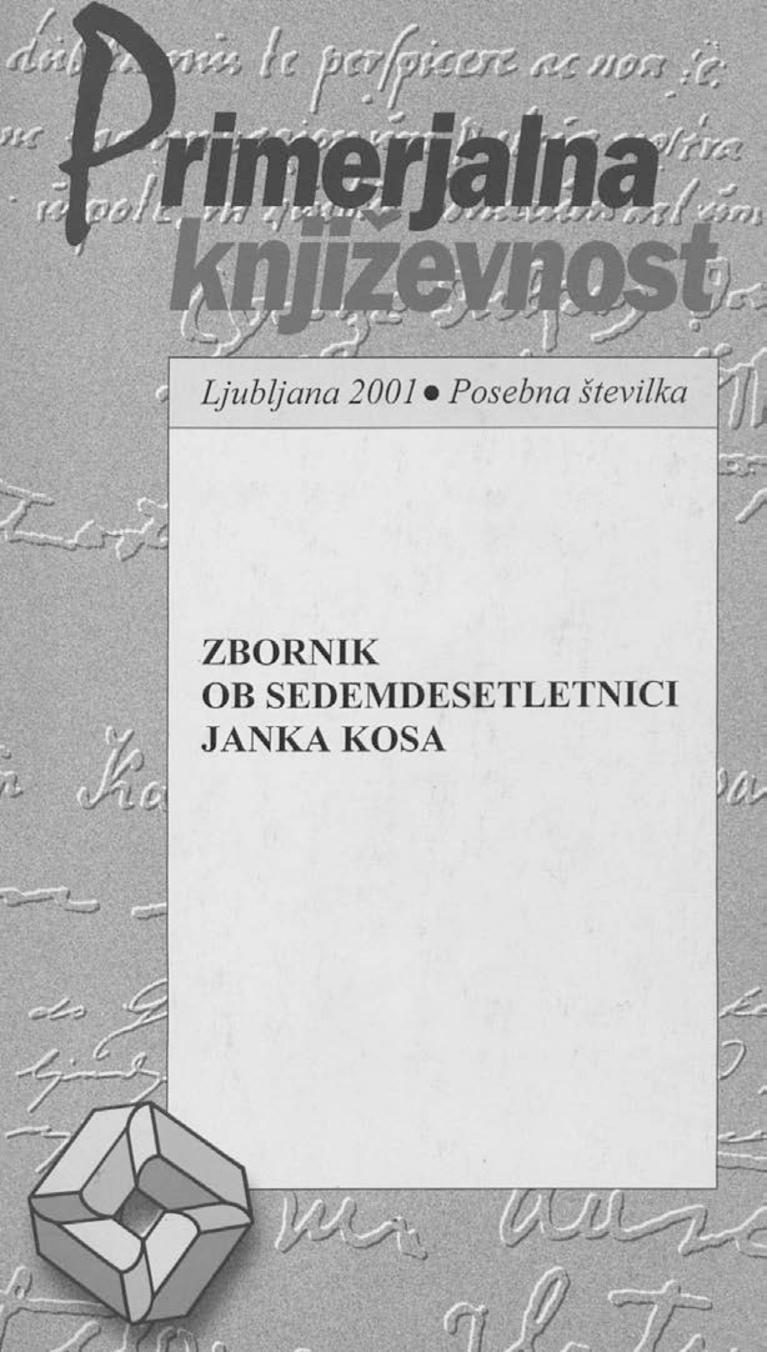Multikulturalizem, večjezikovnost in modernost
Povzetek
Razprava se osredotoča na odgovor, zakaj se je problem multikulturnosti in večjezikovnosti v zadnjih dveh desetletjih 20. st. znašel v središču resnih znanstvenih interesov humanistike in zakaj je tudi v literaturi prišlo do tematizacije teh vprašanj. Izpostavljeno je stališče, da so multikulturalizem, večjezikovnost in modernost soodnosna vprašanja in da so ta vprašanja o decentrirani identiteti, pogojena v realistični teoriji védenja in postpozitivistični koncepciji objektivnega, v temelju vezana na historične premike v samodojemanju človeka. Z utrditvijo koncepcij logike drugosti kot opcije postkolonialnega diskurza so ti premiki k filozofiji konkretnega in pluralistični ontologiji dopuščali platformo za prepoznavanje bolj kompleksnih dejstev umetnosti in kulture.Literatura
ATKIN, Ron, 1981. Multidimensional Man. Can Man Live in 3-Dimensional Space? New York in Harmondsworth: Penguin Books 1981.
BAHTIN, Mihail, 1982. Teorija romana. Ljubljana: Cankarjeva založba 1982.
BAKHTIN, Mihail M., 1986. Speech Genres and Other Essays. Caryl Emerson in Michael Holquist, ur., Austin: University of Texas Press 1986.
BAUDELAIRE, Charles, 1968. Œuvres complètes. Pariz: Seuil 1968.
BECK MATUŠTIK, Martin J., 1998. »Ludic, Corporate and Imperial Multiculturalism: Impostors of Democracy and Cartographers of the New World Order.« V: WILLETT, Cynthia, ur. Theorizing Multiculturalism. Oxford: Blackwell 1998, str. 100–117.
BEEBE, Maurice, 1973. »What Modernism Was?« V: Journal of Modern Literature, 3, 1973, št. 5, str. 1065–80.
BRADBURY, Malcolm, McFARLANE, James, ur., 1976. Modernism 1890–1930. Harmondsworth: Penguin Books 1976.
CALINESCU, Matei, 1977. Faces of Modernity. Bloomington, London: Indiana University Press 1977.
DE MAN, Paul, 1971. Blindness and Insight. New York: Oxford University Press 1971.
DE MAN, Paul, 1970. »Literary History and Literary Modernity.« V: Daedalus 1970, str. 384–404.
DESCOMBES, Vincent, 1982. Modern French Philosophy. Cambridge: Cambridge University Press 1982. Izvirnik je izšel v francoščini 1979.
FINKIELKRAUT, Alain, 1995. The Defeat of the Mind. New York: Columbia University Press 1995. Izvirnik je izšel v francoščini 1987.
FOUCAULT, Michel, 1973. The Order of Things: An Archaeology of the Human Sciences. New York: Vintage Books 1973. Izvirnik je izšel v francoščini.
HOLQUIST, Michael, ur., 1981. The Dialogic Imagination. Four Essays by M. M. Bakhtin. Austin: University of Texas Press 1981.
HUSSERL, Edmund, 1989. Kriza evropskega človeštva in filozofija. Prev. Tine Hribar. Maribor: Založba Obzorja 1989.
JOYCE, James, 1934. Ulysses. New York: Random House 1934. Ulikses. Ljubljana: Cankarjeva založba 1993.
KERSHNER, R. B., 1989. Joyce, Bakhtin, and Popular Literature: Chronicles of Disorder. Chapel Hill: University of North Carolina Press 1989.
KOVAČIČ, Lojze, 1989. Basel. Ljubljana: Cankarjeva založba 1989.
KRISTEVA, Julia, 1984. Desire in Language. A Semiotic Approach to Literature of Art. Oxford: Basil Blackwell 1984. Izvirnik je izšel v francoščini 1979.
LE RIDER, Jacques, 1993. Modernity and Crisis of Identity. Culture and Society in Fin-de-Siècle Vienna. Oxford: Polity Press 1993. Izvirnik je izšel v francoščini 1990.
LUFT, David S., 1980. Robert Musil and the Crisis of European Culture, 1880–1942. Berkeley: University of California Press 1980.
LYOTARD, Jean-François, 1984. The Postmodern Condition: A Report on Knowledge. Manchester: Manchester University Press 1984. Izvirnik je izšel v francoščini 1979.
MAGRIS, Claudio, 1988. Dunav. Zagreb: Grafički zavod Hrvatske 1988. Italijanski izvirnik je izšel 1986.
MAKARYK, Irena R., ur., 1993. Encyclopedia of Contemporary Literary Theory. Toronto: University of Toronto Press 1993.
MATVEJEVIĆ, Predrag, 2000. Mediteranski brevir. Ljubljana: Cankarjeva založba 2000. Izvirnik je izšel 1987.
McCLINTOCK, Anne, MUFTI, Aamir, SHOHAT, Ella, ur., 1997. Dangerous Liaisons. Gender, Nation and Postcolonial Perspectives. Minneapolis, London: University of Minnesota Press 1997.
MOHANTY, Satya P., 1997. Literary Theory and the Claims of History. Postmodernism, Objectivity, Multicultural Politics. Ithaca, London: Cornell University Press 1997.
NIETZSCHE, Friedrich, 1968. The Will to Power. Prev. Walter Kaufmann in R. J. Hollingdale. New York 1968. Volja do moči. Prev. Janko Moder. Ljubljana: Slovenska matica 1991.
OSBORNE, Peter, 1989. »Overcoming Philosophy as Metaphysics.« V: The Oxford Literary Review 11, 1989, št. 1–2, str. 73–101.
PROUST, Marcel, 1997. Spet najdeni čas. Iskanje izgubljenega časa VII. Prev. Radojka Vrančič. Ljubljana 1997.
RICCOMINI, Donald R., 1980. »Defamiliarization, Reflexive Reference, and Modernism.« V: Harry R. GARVIN, ur. Romanticism, Modernism, Postmodernism. London 1980, str. 107–13.
RICOEUR, Paul, 1991. »Narrative Identity.« V: David WOOD, ur. On Paul Ricoeur. Narrative and Interpretation. London, New York: Routledge 1991, str. 188–199. Izvirni tekst »Identité narrative« je izšel v francoščini v reviji Esprit 1988.
RICOEUR, Paul, 1983. Temps et récit I. Pariz: Seuil 1983.
RYAN, Kiernan, 1996. New Historicism and Cultural Materialism. London, New York: Arnold 1996.
SPIVAK, Gayatry Chakravorty, 1994. »Responsibility.« V: Boundary 2, 1994, str. 19–64.
STAM, Robert, 1997. »Multiculturalism and the Neoconservatives.« V: McCLINTOCK, MUFTI, SHOHAT, ur. Dangerous Liaisons. Minneapolis, London 1997, str. 188–203.
ŠKULJ, Jola, 1998. »Modernizem in njegove poteze v lirski, narativni in dramski formi.« Primerjalna književnost 21, 1998, št. 2, str. 45–74.
ŠKULJ, Jola, 2000. »Literature as Repository of Historical Consciousness: Reinterpreted Tales of Mnemosyne.« V: D’HAEN, Theo, VERVLIET, Raymond, ESTOR, Annemarie, ur. Methods for the Study of Literature as Cultural Memory. Amsterdam, Atlanta (Georgia): Rodopi 2000, str. 411–419.
VATTIMO, Gianni, 1992. The Transparent Society. Baltimore: The John Hopkins University Press 1992.
VOLOSHINOV, V. N., 1973. Marxism and the Philosophy of Language. New York: Seminar Press 1973.
WILLETT, Cynthia, ur., 1998. Theorizing Multiculturalism. Oxford: Basil Blackwell 1998.
WOOD, David, ur., 1991. On Paul Ricoeur. Narrative and Interpretation. London: Routledge 1991.


